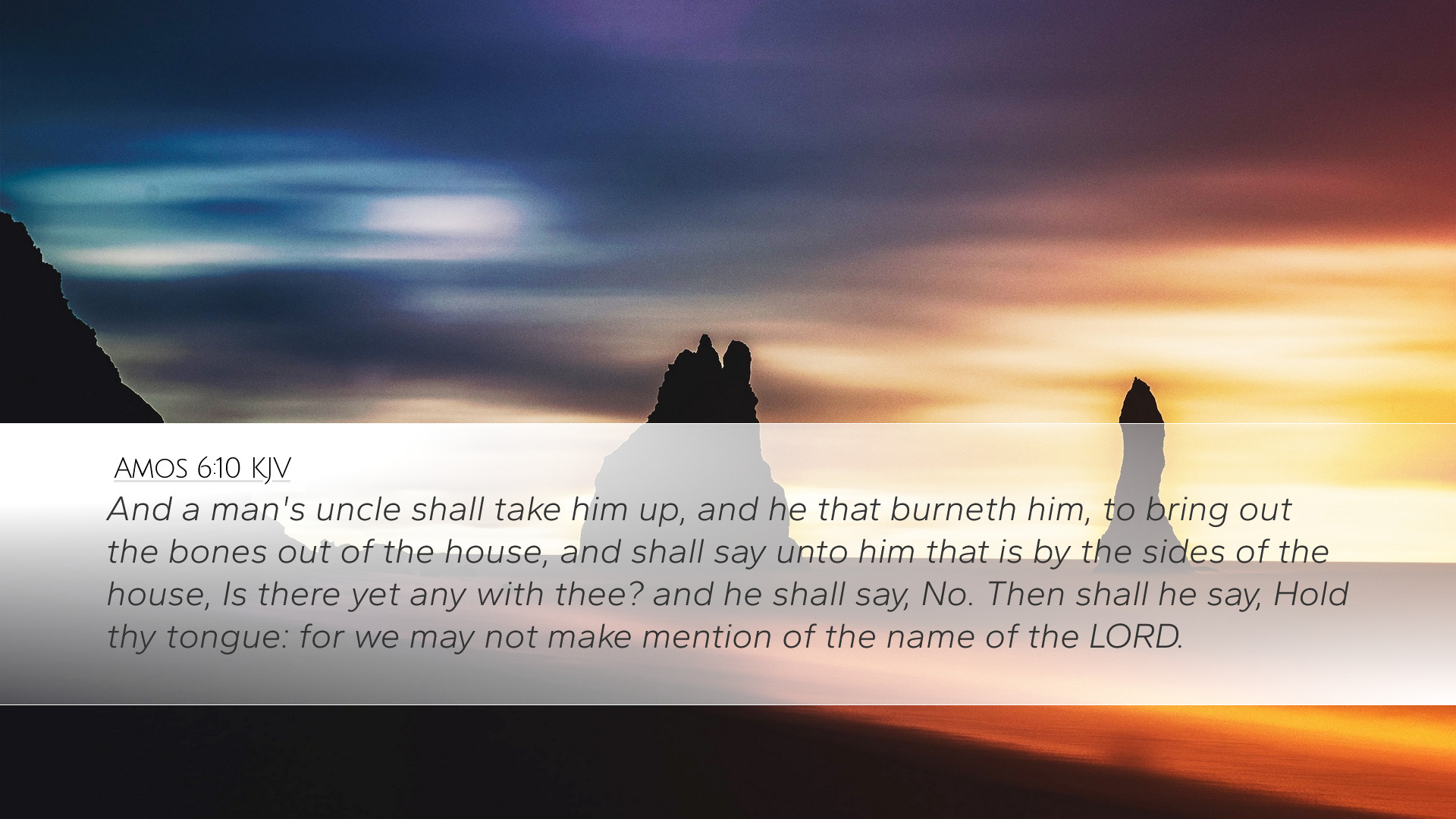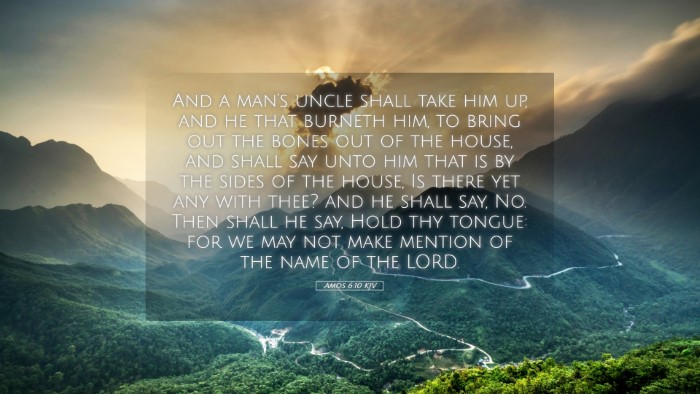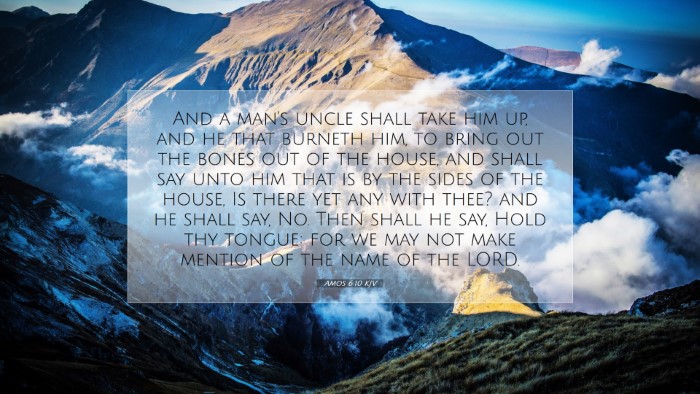Old Testament
Genesis Exodus Leviticus Numbers Deuteronomy Joshua Judges Ruth 1 Samuel 2 Samuel 1 Kings 2 Kings 1 Chronicles 2 Chronicles Ezra Nehemiah Esther Job Psalms Proverbs Ecclesiastes Song of Solomon Isaiah Jeremiah Lamentations Ezekiel Daniel Hosea Joel Amos Obadiah Jonah Micah Nahum Habakkuk Zephaniah Haggai Zechariah MalachiAmos 6:10
Amos 6:10 KJV
And a man's uncle shall take him up, and he that burneth him, to bring out the bones out of the house, and shall say unto him that is by the sides of the house, Is there yet any with thee? and he shall say, No. Then shall he say, Hold thy tongue: for we may not make mention of the name of the LORD.
Amos 6:10 Bible Commentary
Commentary on Amos 6:10
Verse Context and Introduction:
Amos 6:10 reads: "And a man’s uncle shall take him up, and he that burneth him, to bring out the bones out of the house, and shall say unto him that is by the sides of the house, Is there yet any with thee? and he shall say, No. Then shall he say, Hold thy peace; for we may not make mention of the name of the Lord."
This verse emerges from a profound lamentation concerning the fate of Israel, specifically focusing on the inevitability of judgment and the tragic consequences of sin. The prophet Amos, addressing the indifference and spiritual complacency of the Israelites, presents these haunting images to evoke a sense of urgency and moral reckoning.
Summary of Insights from Public Domain Commentaries
1. Matthew Henry's Observations
Matthew Henry emphasizes that this verse highlights the utter desolation and despair that will envelop Israel in the wake of divine judgment. He points out several themes:
- The Role of the Uncle: The "uncle" refers to a close relative who, in the aftermath of death and destruction, would be responsible for burial rites. This signifies a strong connection to familial obligations now turned grim due to calamity.
- Conveying the Sovereignty of God: Henry underscores that even in the context of calamity, the name of the Lord remains significant. The command to remain silent about it reflects the weight of divine judgment that silences even the most deeply held religious expressions.
- Consequence of Indifference: His commentary suggests that the indifference of the people to spiritual realities leads to catastrophic consequences, which Amos poignantly captures through the imagery of death and mourning.
2. Albert Barnes's Insights
Albert Barnes interprets the verse through the lens of impending disaster and national tragedy, stressing the following points:
- Cultural Practices: Barnes notes that the practices surrounding burial highlight the severity of the judgment; it indicates a scarcity of people left to undertake even the most basic funerary customs.
- Judea’s Unresponsiveness: The surprised answer "No" when asked if there is anyone left symbolizes the spiritual void in Judah. The spiritual leaders' failure to guide their people renders them devoid of hope.
- Implications of Silence: The silence about the name of the Lord indicates a loss of reverence and awe for divine authority. With judgment looming, even mention of God seems out of order, marking a profound spiritual decline.
3. Adam Clarke's Analysis
Adam Clarke provides a detailed exegesis of this verse, focusing on the broader narrative surrounding Amos's prophecies:
- Imagery of Death: Clarke describes the graphic imagery as indicative of a society under siege, where death is rampant, and ancestral rites and traditions are disregarded in the face of national collapse.
- Moral Corruption: He highlights that this moral decay is not merely an outcome of military defeat but is rooted in spiritual corruption. The mention of not invoking the name of the Lord reflects the nation’s declining morality and covenant relationship with God.
- Theological Reflection: Clarke interprets this as a critical theological reflection on the inevitability of divine judgment. Those who turn away from God's commands will ultimately face desolation not just politically, but spiritually.
Thematic Reflection
This verse serves as a sobering reminder to contemporary readers—particularly pastors, theologians, and scholars—of the consequences of collective spiritual indifference. It also reflects how cultural practices surrounding death and mourning can express profound theological truths.
Practical Applications
As one reflects on Amos 6:10, several practical applications arise:
- Encouragement for Spiritual Vigilance: This passage encourages leaders to remain vigilant against complacency in their communities, ensuring that they do not lose touch with the moral imperatives of Scripture.
- Importance of Community Response: The lack of community response during times of tragedy urges modern readers to regard their roles within their communities actively, supporting one another in spiritual and practical ways.
- Emphasis on Repentance: It calls for a heartfelt return to God, recognizing that silence towards the divine is a signal of deeper issues within the heart.
Conclusion
In summation, Amos 6:10 serves as a penetrating exploration of the consequences of sin and a clarion call for repentance. Through the insights gleaned from Henry, Barnes, and Clarke, it becomes evident that the silence described is emblematic of a profound spiritual drought arising from disobedience. For those engaged in pastoral care, theological reflection, or academic study, the verse invites deep engagement with both the text and its implications for faith and practice in contemporary society.


